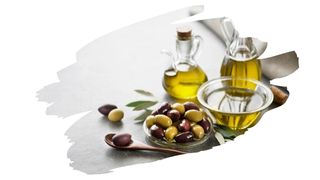A lot of popular culinary oils make for terrible cutting board wood finishes. In fact, food-based oils are often the worst offenders for ruining otherwise perfectly good chopping blocks.
That’s because culinary oils have a limited shelf life. And, once they’ve soaked down into that wooden board, it’s next to impossible to rinse those rancid oils away.
And when it comes to Olive oil, it is no exception.
So, in this post, we explain why culinary oils make for poor wood finishes. You’ll also discover which specific refined food-source oil still makes for a surprisingly good cutting board wood finish.

This post may contain affiliate links to products that we receive a commission for (at no additional cost to you). Learn more here.
How Do You Seal A Wooden Cutting Board?
The best way to seal cutting boards is by coating them with a non-drying oil finish.
A penetrating oil finish will sink right down into cutting board timber. Once there, it will coat wood fibers, making it difficult for that board to absorb moisture.
Now, a non-drying oil is one that doesn’t dry and cure into a hard film coat. And since they’re obviously greasy substances, they pretty much stay inside that board (despite frequent washes).
Which is why you must not saturate cutting boards with any oil product that has an expiry date.
You see, the best oil finishes for cutting boards are always highly refined. And unrefined oils, like vegetable oil or sunflower oil, contain proteins that will go bad over time.
Basically, the limited shelf life of culinary oils makes them completely unsuitable as a wood finish.
What Is The Difference Between A Drying Oil And A Non-Drying Oil? Drying oils, (like Linseed oil and Tung oil), will dry and cure into a durable hard resin coat. Non-drying oils do not dry, do not cure, and stay permanently greasy.
Is That Why My Olive Oil Wood Finish Has Gone Rancid?
Yes, pretty much, because Olive oil can go bad.
From the moment you open the bottle, the fatty acids in this oil will start to go off. Which is why this oils product label will often tell you to use that oil up within six months.
And simply using it as a wood finish doesn’t change that time-limit.
Related Post: What Food Grade Wood Glue Is Safe Enough For Your Cutting Board?
So What Can I Use Instead Of Olive Oil?
You can use 100% pure food grade Mineral oil, which is a highly refined version of petroleum.
This wood finish is safe enough for human consumption. And that makes it ideal for sealing food prepping cookware, like a cutting board or spoon.
Related Post: Walnut Oil Vs Mineral Oil: Which One’s Better For Your Cutting Board?
Still, the fact it’s made from the same stuff as diesel, can be a little off-putting to most people.
So, if you want a food-sourced non-drying oil finish — that won’t go rancid — then use Fractionated Coconut oil.
This heavily filtered version of coconut oil is non-toxic. And it is as safe for human consumption as Olive oil or Mineral oil.
However, what makes Fractionated Coconut oil suitable as a wood finish, is the fact that it’s been filtered.
This filtering process separates out select fatty acids naturally found in Coconut oil. And it is those fatty acids that are responsible for regular Coconut oil going rancid.
Nevertheless, with those fatty acids removed, Fractionated Coconut oil doesn’t have an expiry date hanging over it.
This oil finish is virtually odorless. And it is a much thinner substance than unfiltered Coconut oil.
What’s more, it’ll do a great job as a finish, preventing moisture and fluids from becoming absorbed into your board.
If you want to learn more about Fractionated Coconut oil, check out our post: What Will Fractionated Coconut Oil Do To Your Cutting Board?
To Wrap Up, Here Are The 3 Key Takeaways From This Post…
- 1). Culinary cooking oils, (like Olive oil), contain fatty acids that cause these oils to go bad.
- 2). The fact that these oils can expire and go rancid, makes them unsuitable as wood finishes.
- 3). If you want to seal a cutting board, use Pure Food Grade Mineral Oil or Fractionated Coconut Oil. These two non-drying oils have been heavily refined, and they do not expire.



